人教新版英语八年级上册全册教材全解Unit
人教版英语八年级上册全册教材全解Unit 3
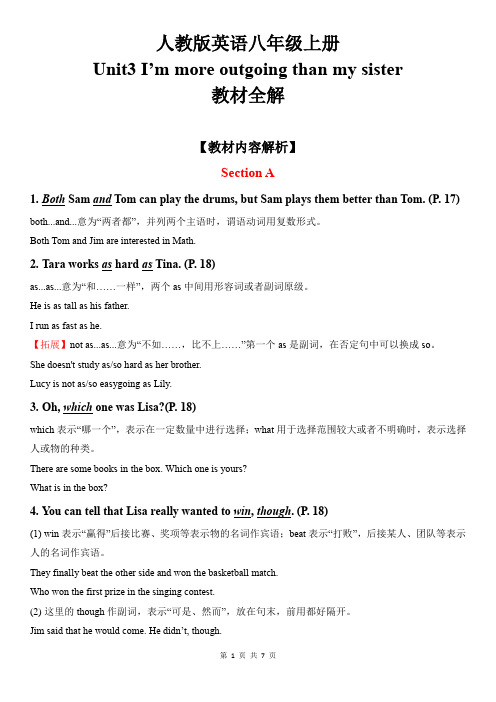
人教版英语八年级上册Unit3 I’m more outgoing than my sister教材全解【教材内容解析】Section A1.Both Sam and Tom can play the drums, but Sam plays them better than Tom. (P. 17) both...and...意为“两者都”,并列两个主语时,谓语动词用复数形式。
Both Tom and Jim are interested in Math.2.Tara works as hard as Tina. (P. 18)as...as...意为“和……一样”,两个as中间用形容词或者副词原级。
He is as tall as his father.I run as fast as he.【拓展】not as...as...意为“不如……,比不上……”第一个as是副词,在否定句中可以换成so。
She doesn't study as/so hard as her brother.Lucy is not as/so easygoing as Lily.3.Oh, which one was Lisa?(P. 18)which表示“哪一个”,表示在一定数量中进行选择;what用于选择范围较大或者不明确时,表示选择人或物的种类。
There are some books in the box. Which one is yours?What is in the box?4.You can tell that Lisa really wanted to win, though.(P. 18)(1) win表示“赢得”后接比赛、奖项等表示物的名词作宾语;beat表示“打败”,后接某人、团队等表示人的名词作宾语。
They finally beat the other side and won the basketball match.Who won the first prize in the singing contest.(2)这里的though作副词,表示“可是、然而”,放在句末,前用都好隔开。
最新人教版八年级英语(上)教材全解Unit1-3名师优秀教案
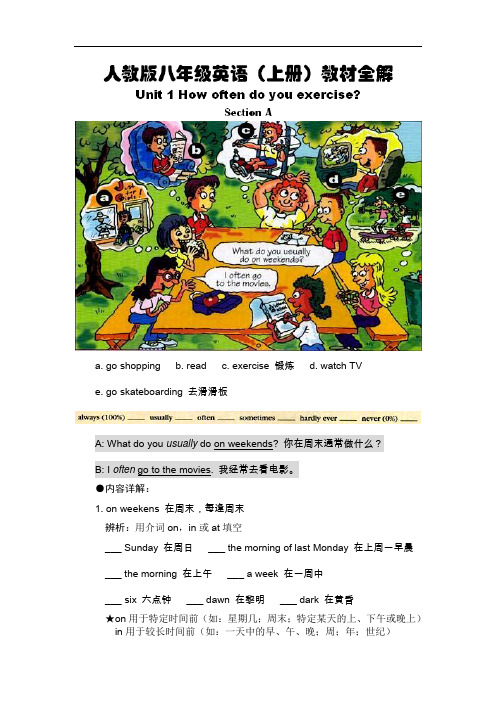
a. go shoppingb. readc. exercise 锻炼d. watch TVe. go skateboarding 去滑滑板●内容详解:1. on weekens 在周末,每逢周末辨析:用介词on,in或at填空___ Sunday 在周日___ the morning of last Monday 在上周一早晨___ the morning 在上午___ a week 在一周中___ six 六点钟___ dawn 在黎明___ dark 在黄昏★on用于特定时间前(如:星期几;周末;特定某天的上、下午或晚上)in用于较长时间前(如:一天中的早、午、晚;周;年;世纪)at用于具体时刻(如:点钟、黎明、黄昏、午夜midnight)★答案:on;on;in;in;at;at;at2. go to the movies 去看电影★其他说法:go to the cinema和go to see a film3.句型:What+助动词(do/does)+sb.+do?Sb.+频率副词+do/does sth.★一般现在时表示经常性、习惯性的动作或存在的状态。
主句是非第三人称单数时,谓语动词用原形;主语是第三人称单数时,谓语动词要在词尾加-s或-es。
例句:A: What does she usually do on weekends?B: She often goes to the movies.请将以下句子翻译成英语:小明周末通常做什么?他经常在周末打篮球。
她总是在周末购物。
张强很少在周末锻炼。
我有时在周末读书。
他从来不在星期一看电视。
答案:What does Xiao Ming usually do on weekends?He often plays basketball on weekends.She always goes shopping on weekends.Zhang Qiang hardly ever exercises on weekends.I sometimes read on weekends. / I read on weekends sometimes. /Sometimes I read on weekends.He never watches TV on Monday.4.频率副词:表示频率的副词(短语)通常用于一般现在时或一般过去时(过去的某段时间里做某事的频率)的句子里,频率副词(短语)常放在行为动词之前,系动词、情态动词或助动词之后。
人教新版英语八年级(上册)(全册)教材全解Unit

人教版英语八年级上册Unit 10 If you go to the party, you'll have a greattime!教材全解[教材内容解读]Section A1.If you go to the party, you’ll have a great time. <P. 73>have a great time意为"过得愉快、玩得开心",相当于enjoy oneself或者have fun。
They are having a great time in the park.=They are enjoying themselves in the park.2. The students are talking about when to have a class party/a class meeting/a birthday party. <P. 74>have a class meeting意为"开班会"。
We will have a class meeting next week.3. What will Mark organize? <P. 74>organize用作及物动词,表示"组织、安排",后接表示组织、活动类的名词做宾语,名词形式为organization表示"组织"。
Last month, we organized a party.4....let’s order food from a restaurant. <P. 74>order此处表示"订购、点菜",order sth. from...表示"从……订购某物"。
I ordered some chicken from that shop.[拓展]order还可以作及物动词,意为"命令",表示"命令"时,常用于order sb. <not> to do sth.结构中The police ordered him to wait right here.5.If we ask people to bring food, they’ll just bring potato chips and chocolate because they’ll be too lazy to cook. <P. 74>ask sb. to do sth.意为"要求某人做某事",否定形式为ask sb. not to do sth."要求某人不要做某事"。
人教版英语八年级上册全册教材全解:人教版英语八年级上册 Unit 7 Will people hav
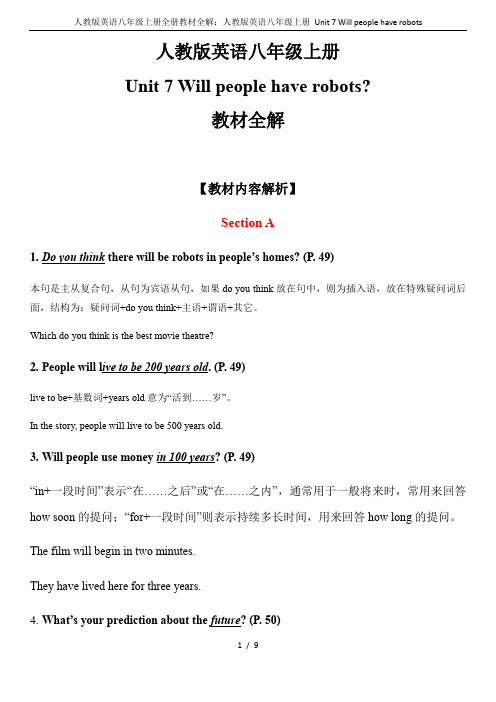
人教版英语八年级上册Unit 7 Will people have robots?教材全解【教材内容解析】Section A1.Do you think there will be robots in people’s homes? (P. 49)本句是主从复合句,从句为宾语从句,如果do you think放在句中,则为插入语,放在特殊疑问词后面,结构为:疑问词+do you think+主语+谓语+其它。
Which do you think is the best movie theatre?2.People will l ive to be 200 years old. (P. 49)live to be+基数词+years old意为“活到……岁”。
In the story, people will live to be 500 years old.3.Will people use money in 100 years? (P. 49)“in+一段时间”表示“在……之后”或“在……之内”,通常用于一般将来时,常用来回答how soon的提问;“for+一段时间”则表示持续多长时间,用来回答how long的提问。
The film will begin in two minutes.They have lived here for three years.4.What’s your prediction about the future?(P. 50)future作名词,表示“将来、未来”,in the future表示“在将来”。
Who knows what will happen in the future.5.I don’t think so.(P. 50)I don’t think so表示“我不这么认为”,肯定形式为I think so。
---Look at the cloud. It is going to rain.---I don’t think so. It will be sunny soon.【拓展】类似的结构还有:I hope so“我希望如此”,I hope not“我希望不是这样”,I’m afraid so“恐怕如此”,I’m afraid not“恐怕不是这样的”。
(完整版)人教版英语八年级上册全册教材全解:人教版英语八年级上册Unit1Wheredidyougoonvacation教材全解
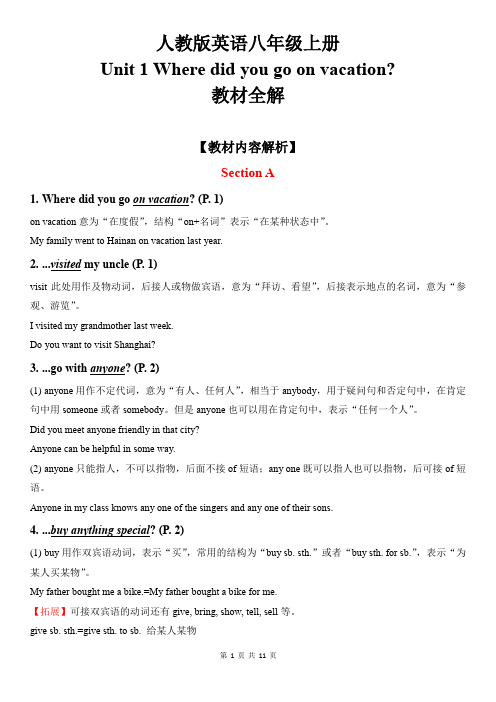
人教版英语八年级上册Unit 1 Where did you go on vacation?教材全解【教材内容解析】Section A1.Where did you go on vacation? (P. 1)on vacation意为“在度假”,结构“on+名词”表示“在某种状态中”。
My family went to Hainan on vacation last year.2....visited my uncle (P. 1)visit此处用作及物动词,后接人或物做宾语,意为“拜访、看望”,后接表示地点的名词,意为“参观、游览”。
I visited my grandmother last week.Do you want to visit Shanghai?3....go with anyone? (P. 2)(1)anyone用作不定代词,意为“有人、任何人”,相当于anybody,用于疑问句和否定句中,在肯定句中用someone或者somebody。
但是anyone也可以用在肯定句中,表示“任何一个人”。
Did you meet anyone friendly in that city?Anyone can be helpful in some way.(2)anyone只能指人,不可以指物,后面不接of短语;any one既可以指人也可以指物,后可接of短语。
Anyone in my class knows any one of the singers and any one of their sons.4....buy anything special? (P. 2)(1)buy用作双宾语动词,表示“买”,常用的结构为“buy sb. sth.”或者“buy sth. for sb.”,表示“为某人买某物”。
My father bought me a bike.=My father bought a bike for me.【拓展】可接双宾语的动词还有give, bring, show, tell, sell等。
【八年级】人教版英语八年级上册全册教材全解Unit10
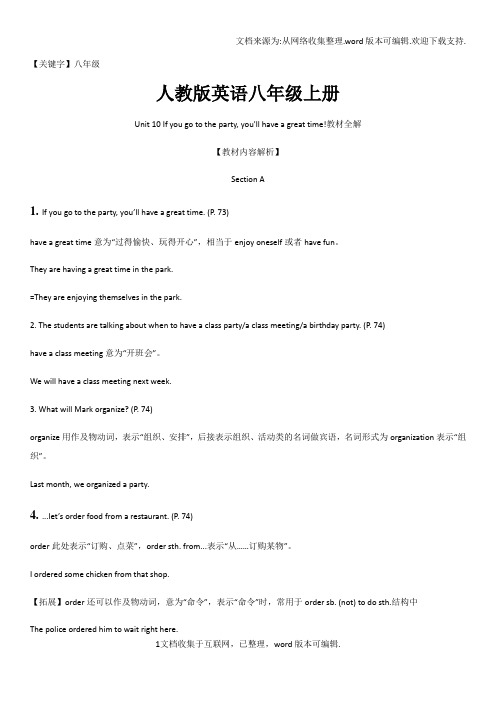
【关键字】八年级人教版英语八年级上册Unit 10 If you go to the party, you'll have a great time!教材全解【教材内容解析】Section A1.If you go to the party, you’ll have a great time. (P. 73)have a great time意为“过得愉快、玩得开心”,相当于enjoy oneself或者have fun。
They are having a great time in the park.=They are enjoying themselves in the park.2. The students are talking about when to have a class party/a class meeting/a birthday party. (P. 74)have a class meeting意为“开班会”。
We will have a class meeting next week.3. What will Mark organize? (P. 74)organize用作及物动词,表示“组织、安排”,后接表示组织、活动类的名词做宾语,名词形式为organization表示“组织”。
Last month, we organized a party.4....let’s order food from a restaurant. (P. 74)order此处表示“订购、点菜”,order sth. from...表示“从……订购某物”。
I ordered some chicken from that shop.【拓展】order还可以作及物动词,意为“命令”,表示“命令”时,常用于order sb. (not) to do sth.结构中The police ordered him to wait right here.5.If we ask people to bring food, they’ll just bring potato chips and chocolate because they’ll be too lazy to cook. (P. 74) ask sb. to do sth.意为“要求某人做某事”,否定形式为ask sb. not to do sth.“要求某人不要做某事”。
人教版英语八年级上册全册教材全解Unit-10
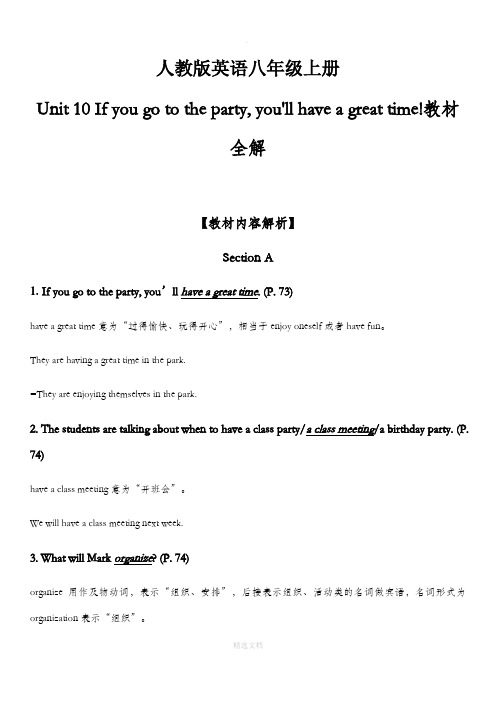
人教版英语八年级上册Unit 10 If you go to the party, you'll have a great time!教材全解【教材内容解析】Section A1.If you go to the party, you’ll have a great time. (P. 73)have a great time意为“过得愉快、玩得开心”,相当于enjoy oneself或者have fun。
They are having a great time in the park.=They are enjoying themselves in the park.2. The students are talking about when to have a class party/a class meeting/a birthday party. (P.74)have a class meeting意为“开班会”。
We will have a class meeting next week.3. What will Mark organize? (P. 74)organize用作及物动词,表示“组织、安排”,后接表示组织、活动类的名词做宾语,名词形式为organization表示“组织”。
Last month, we organized a party.4....let’s order food from a restaurant. (P. 74)order此处表示“订购、点菜”,order sth. from...表示“从……订购某物”。
I ordered some chicken from that shop.【拓展】order还可以作及物动词,意为“命令”,表示“命令”时,常用于order sb. (not) to do sth.结构中The police ordered him to wait right here.5.If we ask people to bring food, they’ll just bring potato chips and chocolate because they’ll be too lazy to cook. (P. 74)ask sb. to do sth.意为“要求某人做某事”,否定形式为ask sb. not to do sth.“要求某人不要做某事”。
人教版英语八年级上册全册教材全解:人教版英语八年级上册 Unit 1 Where did you go on vacation教材全解
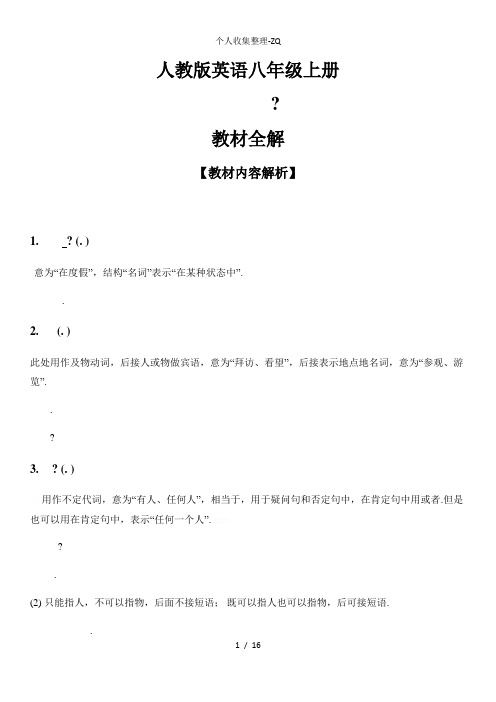
人教版英语八年级上册?教材全解【教材内容解析】1.? (. )意为“在度假”,结构“名词”表示“在某种状态中”..2.(. )此处用作及物动词,后接人或物做宾语,意为“拜访、看望”,后接表示地点地名词,意为“参观、游览”..?3.? (. )用作不定代词,意为“有人、任何人”,相当于,用于疑问句和否定句中,在肯定句中用或者.但是也可以用在肯定句中,表示“任何一个人”.?.(2)只能指人,不可以指物,后面不接短语;既可以指人也可以指物,后可接短语..(1)用作双宾语动词,表示“买”,常用地结构为“ . .”或者“ . .”,表示“为某人买某物”..【拓展】可接双宾语地动词还有, , , , 等.. . . 给某人某物. . . 把某物带给某人. . . 给某人看某物. . . 告诉某人某物. . . 把某物卖给某人(2)形容词修饰复合不定代词(, , , )时,放在复合不定代词后面..5. . (. )意为“拍照、照相”, .意为“给……拍照”..?6. . (. )表示“……中大多数”,后接可数名词或者不可数名词,作主语时,谓语动词单复数取决于后面所接名词地单复数...用作不定代词,表示“没有任何东西”,相当于 .’ .8.? (. )表示“玩得开心”,后接动词,表示“做某事很开心”,相当于 .....9.? (. )...?意为“你认为……怎么样”,相当于 ...?或者 ...??.10.? (. )表示“去购物、去买东西”,相当于 .类似地短语还有: , , , , , 等..11.! (. )意为“当然”,相当于或者.?!12. . (. )() 用作系动词,表示“似乎、好像”,常用地结构有:句子....(2)表示“感到厌倦地”,用来说明人地感受;表示“令人厌烦地、单调地”,用来说明事物地特征..【拓展】以结尾地形容词,通常用来修饰或者描述人,以结尾地动词,通常用来修饰或者描述物,类似地形容词还有:; ; .1.? (. )() 这里表示“发现、觉得”,宾语后常接宾语补足语,常用地结构有:介词短语...., .(2)是地形容词形式,表示“有趣地、令人愉快地”.’ ..2. . (. )作不及物动词,表示“到达”,接宾语时,需要加上介词或者.例如:?’.【拓展】表示“到达”时,是及物动词,后面直接接表示地点地名词作宾语.另外两个表示“到达”地动词(和)都是不及物动词,地点;地点.3. . (. )表示“决定”时,常用地结构为: .“决定做某事”..4.. (. ). “尝试做某事”; . “尽力做某事”...【拓展】也可以用作名词,表示“尝试”,表示“尝试一下”.’ .5. . (. )此处表示“感觉像”,后接从句..【拓展】还可以表示“想要”,后接名词、代词或者动名词做宾语, .???6. ...(. )相当于表示“许多”,可以用来修饰可数名词复数或者不可数名词..【拓展】只修饰不可数名词地量词有: , , , ,只修饰可数名词地量词有: , , , , ,既可以修饰不可数名词也可以修饰可数名词地量词有:, , , ,7. . (. )表示“好奇、想知道”,后接, , , 等引导宾语从句.... . (. )用作及物动词,表示“喜欢”,后接名词、代词或者动名词做宾语.?’ .9.! (. )本句是引导地感叹句,引导地感叹句常用地结构有:“形容词单数可数名词主语谓语”或者“形容词可数名词复数不可数名词主语谓语”.!!!【拓展】引导地感叹句地结构为“形容词副词主语谓语”.!!. , . (. )()表示“想要”时,为及物动词,后接不定式作宾语或者用于句型“ . .”中,表示“想要某人做某事”.’ ..() 后常接名词、动词不定式或者动名词作宾语,用法相当于.?’ .11. . (. )() .“等待某人或者某事”; .“等待做某事”;’.“迫不及待做某事”..’ .(2)此处表示“多于、超过”,相当于 ..() , 和辨析12., ’ . (. )() 意为“因为、由于”,后接名词、代词或者动名词,是连词,引导原因状语从句,后接一个句子...(2)表示“在……以下、低于”,反义词是,意为“在……之上,超过”..13.’ ...(. )()表示“带来”,强调从别地地方带到说话地地方,常与副词连用;表示“带走”,强调从说话地地方带去别地地方,常与副词连用;表示“搬、抬”,没有方向性..()可以用作形容词,表示“足够地、充分地”,用来修饰名词,可以放在名词前面,也可以放在名词后面...【拓展】还可以用作副词,修饰形容词或者副词,放在形容词或者副词后面,常用地结构为:.“足够……能够做某事”...14., . (. )当我们要表示双方某方面(如年龄、身高等)程度相同或不同时,常用…或…结构,表示“和……一样”或“和……不一样”.如:.玛丽和琳达一样仔细..他跑步没有汤姆快.15. . (. ).“忘记做某事”,强调忘记去做某事,实际上也没有做;.“忘记做过某事”,强调已经做过某事,但是忘记了..’ .’?16.? (. )意为“为什么”,表示提出建议,后接动词原形,相当于’ ...??’?17. . (. )此处表示“具有、带有”,还可以表示“和……在一起”或者“用”...18. . (. )...意为“如此……以至于……”,用来引导结果状语从句,是副词,后面接形容词或者副词...【拓展】...引导结果状语从句,表示“如此……以至于……”,后面接名词短语,名词前经常跟有形容词进行修饰...19., . (. )(1). .“告诉某人做某事”, . .“告诉某人不要做某事”...(2) .表示“继续做某事、一直做某事”.() 表示“继续”, .表示“(完成一件事后)接着做另一件事”, .意为“继续做同一件事”..’ ..20. . (. )表示“上上下下、来来回回”...21., . (. )意为“升起、发生”...【重点短语和句型归纳】一、重点短语1. 去度假2. 待在家里去爬山去海滩参观博物馆去参加夏令营相当多为测验而学习出去大部分时间玩得高兴当然给……地感觉;感受到去购物在过去四处走走因为. … 一碗……. 第二天喝茶找出;查明继续照相重要地事上上下下出来出版发行跟别人出去发表对…看法雨下得大太多二、重点句型. . . .为某人买某物. 尝起来看起来听起来闻起来不错…动词原形除了……之外什么都没有() . 看起来……大地点小地点地点地点到达某地 .决定去做某事.尝试做某事 .尽力去做某事.忘记做过某事 .忘记做某事.喜欢做某事. .想去做某事.开始做某事. 停止做某事. 不喜欢做某事.继续做某事不停做某事. ’ 为什么不做……呢?从句如此……以至于……. () . 告诉某人(不要)做某事名词,形容词真地没有似乎好像做某事!到这该说再见了.… … …你认为……怎么样【语法讲解】一复合不定代词1、由, , , 加上, , 构成不定代词,成为复合不定代词.2、用法(1)复合不定代词相当于名词,在句中可以用作主语、宾语和表语..’ .’ .(2)复合不定代词被形容词、动词不定式修饰时,形容词和动词不定式后置...(3)复合不定代词做主语时,表示单数概念,谓语动词用单词形式..(4)不定代词用在肯定句中或者表示请求地一般疑问句中;不定代词多用于疑问句中否定句中.??(5)和也可以用在肯定句中,表示“任何人”和“任何事”...二一般过去时地规则动词和不规则动词(一)规则变化构成规则:在动词末尾直接加 . 例如,, , –以不发音地字母结尾地动词,直接加 . 例如,– , – , –以辅音字母结尾地,变为再加 . 例如,– , – , –以重读闭音节结尾且末尾只有一个辅音字母地,双写最后地辅音字母,再加 . 例如,– , –(二)不规则变化. 没有变化,即:与动词原形一样.例如,– , – , –. 变化元音,例如,, – , –. 变化辅音,例如,– , – , –. 辅音和元音都变化,例如,– , – , –. 其他情况,例如,– , – , –。
人教版英语八年级上册全册教材全解: Unit 7 Will people have robots
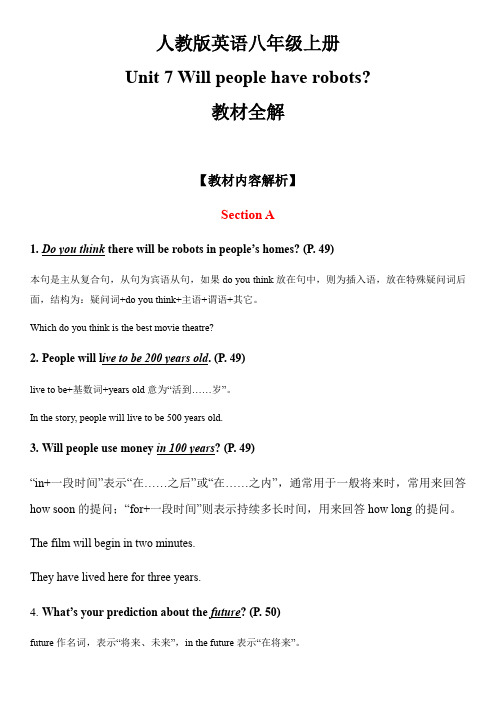
人教版英语八年级上册Unit 7 Will people have robots?教材全解【教材内容解析】Section A1.Do you think there will be robots in people’s homes? (P. 49)本句是主从复合句,从句为宾语从句,如果do you think放在句中,则为插入语,放在特殊疑问词后面,结构为:疑问词+do you think+主语+谓语+其它。
Which do you think is the best movie theatre?2.People will l ive to be 200 years old. (P. 49)live to be+基数词+years old意为“活到……岁”。
In the story, people will live to be 500 years old.3.Will people use money in 100 years? (P. 49)“in+一段时间”表示“在……之后”或“在……之内”,通常用于一般将来时,常用来回答how soon的提问;“for+一段时间”则表示持续多长时间,用来回答how long的提问。
The film will begin in two minutes.They have lived here for three years.4.What’s your prediction about the future?(P. 50)future作名词,表示“将来、未来”,in the future表示“在将来”。
Who knows what will happen in the future.5.I don’t think so.(P. 50)I don’t think so表示“我不这么认为”,肯定形式为I think so。
---Look at the cloud. It is going to rain.---I don’t think so. It will be sunny soon.【拓展】类似的结构还有:I hope so“我希望如此”,I hope not“我希望不是这样”,I’m afraid so“恐怕如此”,I’m afraid not“恐怕不是这样的”。
人教版英语八年级上册全册教材全解Unit-10
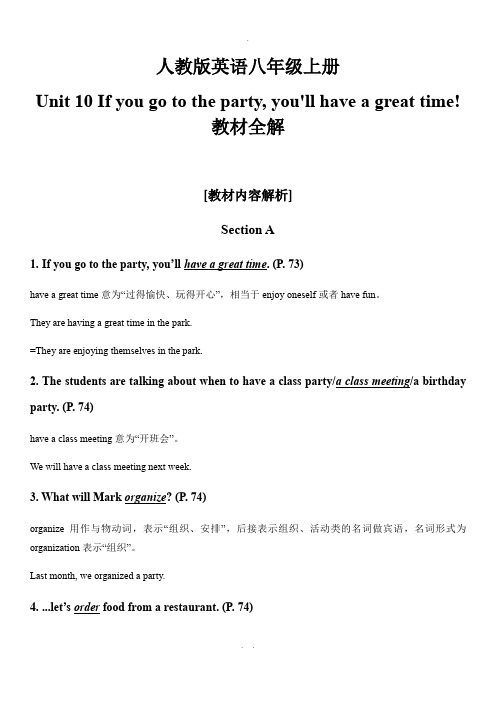
人教版英语八年级上册Unit 10 If you go to the party, you'll have a great time!教材全解[教材内容解析]Section A1.If you go to the party, you’ll have a great time. (P. 73)have a great time意为“过得愉快、玩得开心”,相当于enjoy oneself或者have fun。
They are having a great time in the park.=They are enjoying themselves in the park.2. The students are talking about when to have a class party/a class meeting/a birthday party. (P. 74)have a class meeting意为“开班会”。
We will have a class meeting next week.3. What will Mark organize? (P. 74)organize用作与物动词,表示“组织、安排”,后接表示组织、活动类的名词做宾语,名词形式为organization表示“组织”。
Last month, we organized a party.4....let’s order food from a restaurant. (P. 74)order此处表示“订购、点菜”,order sth. from...表示“从……订购某物”。
I ordered some chicken from that shop.[拓展]order还可以作与物动词,意为“命令”,表示“命令”时,常用于order sb. (not) to do sth.结构中The police ordered him to wait right here.5.If we ask people to bring food, they’ll just bring potato chips and chocolate because they’ll be too lazy to cook. (P. 74)ask sb. to do sth.意为“要求某人做某事”,否定形式为ask sb. not to do sth.“要求某人不要做某事”。
(完整版)人教版英语八年级上册全册教材全解:人教版英语八年级上册Unit1Wheredidyougoonvacation教材全解

人教版英语八年级上册Unit 1 Where did you go on vacation?教材全解【教材内容解析】Section A1.Where did you go on vacation? (P. 1)on vacation意为“在度假”,结构“on+名词”表示“在某种状态中”。
My family went to Hainan on vacation last year.2....visited my uncle (P. 1)visit此处用作及物动词,后接人或物做宾语,意为“拜访、看望”,后接表示地点的名词,意为“参观、游览”。
I visited my grandmother last week.Do you want to visit Shanghai?3....go with anyone? (P. 2)(1)anyone用作不定代词,意为“有人、任何人”,相当于anybody,用于疑问句和否定句中,在肯定句中用someone或者somebody。
但是anyone也可以用在肯定句中,表示“任何一个人”。
Did you meet anyone friendly in that city?Anyone can be helpful in some way.(2)anyone只能指人,不可以指物,后面不接of短语;any one既可以指人也可以指物,后可接of短语。
Anyone in my class knows any one of the singers and any one of their sons.4....buy anything special? (P. 2)(1)buy用作双宾语动词,表示“买”,常用的结构为“buy sb. sth.”或者“buy sth. for sb.”,表示“为某人买某物”。
My father bought me a bike.=My father bought a bike for me.【拓展】可接双宾语的动词还有give, bring, show, tell, sell等。
- 1、下载文档前请自行甄别文档内容的完整性,平台不提供额外的编辑、内容补充、找答案等附加服务。
- 2、"仅部分预览"的文档,不可在线预览部分如存在完整性等问题,可反馈申请退款(可完整预览的文档不适用该条件!)。
- 3、如文档侵犯您的权益,请联系客服反馈,我们会尽快为您处理(人工客服工作时间:9:00-18:30)。
人教版英语八年级上册Unit 10 If you go to the party, you'll have a great time!教材全解【教材内容解读】Section A1.If you go to the party, you’ll have a great time. (P. 73)have a great time意为“过得愉快、玩得开心”,相当于enjoy oneself或者have fun。
They are having a great time in the park.=They are enjoying themselves in the park.2. The students are talking about when to have a class party/a class meeting/a birthday party. (P. 74)have a class meeting意为“开班会”。
We will have a class meeting next week.3. What will Mark organize? (P. 74)organize用作及物动词,表示“组织、安排”,后接表示组织、活动类的名词做宾语,名词形式为organization表示“组织”。
Last month, we organized a party.4....let’s order food from a restaurant. (P. 74)order此处表示“订购、点菜”,order sth. from...表示“从……订购某物”。
I ordered some chicken from that shop.【拓展】order还可以作及物动词,意为“命令”,表示“命令”时,常用于order sb. (not) to do sth.结构中The police ordered him to wait right here.5.If we ask people to bring food, they’ll just bring potato chips and chocolate because they’ll be too lazy to cook. (P. 74)ask sb. to do sth.意为“要求某人做某事”,否定形式为ask sb. not to do sth.“要求某人不要做某事”。
My parents ask me to take my study seriously.He asked the boys not dig holes on the ground.6.If I go to the party, they will be upset.(P. 75)upset作形容词,意为“难过、失望、沮丧”,be upset with sb.“生某人的气、对某人感到不快”。
She was upset about the way her father treated her.She is upset with me.7.Can you give me some advice please? (P. 75)advice是不可数名词,意为“意见、建议”,a piece of advice表示“一条建议”。
I will give you some advice on how to take care of your pet dog.[拓展]1.advice的常用搭配:advice on关于……的建议ask for advice 征求建议follow/take sb’s advice 接受某人的建议2.advise作动词,表示“建议”,常用于以下两种结构中:advise doing sth.建议做某事;advise sb. to do sth. 建议某人做某事。
例如:My mother advised starting off earlier.I advised him to stop smoking.Section B1.If people have problems, they should keep them to themselves. (P. 77)keep...to oneself意为“保守秘密、把问题/烦恼埋在心底”。
I promise to keep it to myself.The teenagers like to keep their problems to themselves.2.“Problems and worries are normal in life,” says Laura. (P. 77)normal用作形容词,表示“正常的、一般的”,副词形式为normally。
It’s normal to feel nervous before an exam.We normally plant trees in spring.3.Unless we talk to someone, we’ll certainly feel worse. (P. 77)unless用作连词,意为“除非、如果不”,相当于if not,引导条件状语从句,主句用一般将来时,从句用一般现在时代替一般将来时。
Unless he invites me, I won’t go to his party.=If he doesn’t invite me , I won’t go to his party.4.She was afraid to tell her parents about it. (P. 77)be afraid to do sth. 意为“胆小不敢做某事”。
He was afraid to go out at night.【拓展】be afraid of意为“害怕、不敢”,后接名词、代词或者动名词;be afraid that...意为“担心、害怕”。
She is afraid of snakes.I was afraid of going through the woods.He was afraid that he would lose.5.If I tell my parents, they’ll be angry! (P. 77)①be angry with sb.“生某人的气”The wife was still angry with her husband.②be angry about/at sth.“因某事而生气”The teacher was angry at the silly mistakes the students made in the exam.6.Her dad said that he sometimes made careless mistakes himself. (P. 77)mistake用作可数名词,表示“错误、失误”,复数形式为mistakes,常用的短语为:make mistakes/make a mistake“犯错误”,by mistake“错误地、无意中”。
You should be more careful so that you won’t make mistakes.7.They got her a new wallet and asked her to be more careful. (P. 77)careful用作形容词,表示“小心的、慎重的”,常用的结构为:be careful about/with“当心、留意”;be careful to do sth.“当心做某事”。
You must be careful about your spelling.He is careful to read every word.8.Robert Hunt advises students about common problems. (P. 77)advise sb. on/about...“关于……给某人忠告/建议”。
The teachers advise students about study.【拓展】advise作动词,表示“建议”,常用于以下两种结构中:advise doing sth.建议做某事;advise sb. to do sth. 建议某人做某事。
My mother advised starting off earlier.I advised him to stop smoking.9.It is best not torun away from our problems.(P. 77)(1)It is best (not) to do sth.意为“最好(不要)做某事”,it为形式主语,动词不定式才是真正的主语,相当于you’d better (not) do sth.。
It is best to speak English every day.=You’d better speak English every day.(2)run away from“逃避、回避”。
You can not run away from your responsibilities.10.We should always try to solve them. (P. 77)solve表示“解决”,常与problem连用,表示解决难度较大的问题,answer表示“回答、回复”,常与question连用,表示回答常见的问题。
Money can’t solve all the problems.Who can answer my questions.11.He thinks the first step to is to find someone you trust to talk to.(P. 77)(1)step用作可数名词,意为“步、步骤”。
Please move two steps.Can you tell me the next step?(2)trust用作及物动词,表示“相信、信任”,后接名词或者代词做宾语,trust sb. (not) to do sth.“相信某人(不)会做某事”。
You can trust me not to tell anyone else.12.Students often forget that their parents have more experience...(P. 77)experience此处用作不可数名词,意为“经验”。
